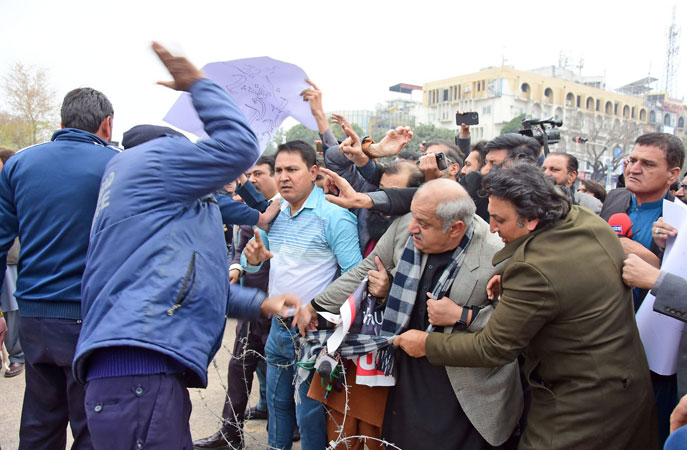 The Senate on Tuesday passed controversial amendments to the country’s cybercrime laws – the Prevention of Electronic Crimes Act (Peca) 2016 – triggering countrywide protests by media bodies who fear the changes would be used against journalists.
The Senate on Tuesday passed controversial amendments to the country’s cybercrime laws – the Prevention of Electronic Crimes Act (Peca) 2016 – triggering countrywide protests by media bodies who fear the changes would be used against journalists.
The Prevention of Electronic Crimes (Amendment) Bill, 2025 adds Section 26(A) to Peca, which seeks to penalise perpetrators of “fake news” online. It says anyone who intentionally spreads, displays, or transmits false information likely to cause fear, panic, or unrest in society may face up to three years’ imprisonment, a fine of up to Rs2 million, or both. The bill now awaits the president’s assent to become law.
Journalists have assailed the legislation as an “attack on freedom of expression”, while the opposition PTI has accused the PPP, an ally of the ruling coalition, of hypocrisy, slamming its support for the bill.
Following the Senate’s greenlight to the widely criticised amendments, journalists across all provinces of Pakistan staged protests, vowing to hold further rallies against the legislation.
The Peca bill was moved in the Senate by Minister for Industries and Production Rana Tanveer Hussain on behalf of Interior Minister Mohsin Naqvi.
As the bill was introduced, journalists present in the Senate’s press gallery staged a walkout in protest, recreating scenes witnessed last week when the amendments were passed by the National Assembly.
PTI’s Shibli Faraz, the leader of the opposition in the Senate, spoke out against it, highlighting that while laws were made to protect people, the Peca amendment aimed to “target a specific political party”.
“When a new law is introduced, its intent is scrutinised. Whether it’s social media or any other medium, it should operate within specific boundaries,” Faraz said. “The purpose of this bill is to target a specific political party.”
Meanwhile, replying to Faraz after the bill’s passage, industries minister Hussain said that the bill was neither set in stone nor aimed at journalists.
“This law will not deal with TV newspapers but social media,” he said, adding that the amendment could also “be improved”. “Journalists have nothing to do with this bill,” he insisted.
The Senate also passed the Digital Nation bill, which now awaits the president’s assent as it was already approved by the NA. The Senate session was then adjourned indefinitely.
Following the Senate’s greenlight to the widely criticised Peca amendments, journalists in various major cities across the country staged protests against them.
According to media reports, cities where protests were held included Islamabad, Karachi, Lahore, Quetta, Faisalabad, Bahawalnagar and Sukkur.
Members of the Pakistan Federal Union of Journalists (PFUJ) shout slogans during a protest against amendments in the Prevention of Electronic Crimes Act (Peca) in Karachi on January 28. – AFP
AFP pictures showed Karachi Union of Journalists written on placards held by protesting media workers. “Black law not accepted” read one banner. Those demonstrating in the federal capital expressed their rage by wrapping chains around their hands.
One of the media bodies participating in those was the Pakistan Federal Union of Journalists (PFUJ), which had called for nationwide protests.
Speaking at a protest in Islamabad, PFUJ President Afzal Butt called on President Asif Ali Zardari to schedule a meeting with the union’s Joint Action Committee (JAC) so that his organisation could apprise him of what parts of the amendment were against freedom of expression and fundamental rights guaranteed in the Constitution.
The PFUJ head called on ex-premier Nawaz Sharif, president of the ruling PML-N, to “review his decision”. “If both these gentlemen do not set their parties right, then do not complain to us tomorrow,” he warned, referring to coalition partners PPP and PML-N.